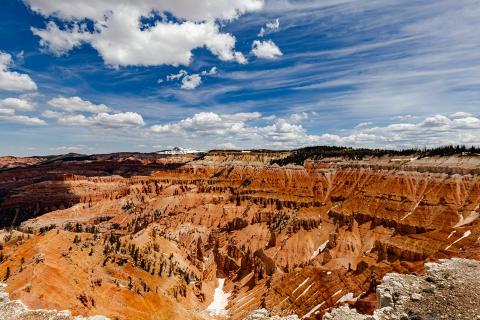
Permit recommendations for 2019-20 cougar, bobcat hunts
SALT LAKE CITY — The Utah Division of Wildlife Resources is recommending slightly more cougar permits and slightly fewer bobcat permits for the 2019-20 hunts, and is asking for the public’s feedback.
Cougar permit recommendations
As with each wildlife species in Utah, cougars are managed according to guidelines established in a management plan, which includes regulated hunting. DWR biologists make determinations and gather input from hunters, individuals who don’t hunt and livestock producers, who sometimes have sheep killed by cougars. The plan is then finalized and approved by the Utah Wildlife Board. The current management plan was established in 2015 and expires in 2025. However, adjustments can be made as needed depending on changes in cougar population numbers.
“Our goal is to maintain a healthy cougar population within the current distribution of the species across Utah, while also considering human and livestock safety,” DWR game mammals program coordinator Darren DeBloois said. “As part of this, we factor in a proportion of older age animals, breeding females and healthy cougars in the population.”
Because the cougar populations are meeting the established guidelines in the management plan, DWR biologists are recommending a slight increase in the number of permits for this fall’s hunting season. They are recommending 678 permits, which is an additional 34 from last year’s hunt. However, that doesn’t necessarily mean that more cougars will be harvested this year.
“Cougars are tough to hunt,” DeBloois said. “Not every hunter who gets a permit will harvest one.”
DWR biologists estimate there are about 2,700 adult cougars currently in Utah.
Changes to cougar hunts
There are also a few other changes for this year’s hunt. The new weapon rule amendment recently approved for big game hunts is also being proposed for the cougar hunts. The new rule would allow handgun-archery-muzzleloader-shotgun-only hunts for cougar and bobcat. Weapons used in these hunts have to meet current specifications in the rules, including additional pistol specifications.
The other change would require hunters to provide the location of where they killed their cougar, when it was checked in to the DWR.
“This would provide additional data on where cougars are being harvested around the state and would help us give more tailored recommendations for specific permit numbers on the various hunting units,” DeBloois said.
Bobcat permit recommendations
The bobcat management plan includes three categories for maintaining a healthy population: the number of juvenile bobcats harvested each year, the number of females harvested and a target survival rate for adults. Because all three of those parameters indicated a declining population, DWR biologists are recommending a slight decrease in permits for this year.
“Lower bobcat population numbers may be related to the decrease in the number of rabbits in the state, which is a big food source for bobcats,” DeBloois said.
Biologists are recommending a bobcat hunting season that is one week shorter, which would run from Nov. 20 to March 1, 2020. They are also recommending lowering the number of permits that a person can buy to five, rather than last year’s six. And they are recommending capping the total number of permits sold at 80% of last year’s total, which would allow a maximum of 6,460 permits for this year.
Give feedback
The DWR is asking for the public’s feedback on the recommendations. You can share your thoughts and feedback at your Regional Advisory Council meeting or by emailing the RAC member over your area. The contact information for the RAC members is available on the DWR website.
The information for the meetings is listed below:
Northern Region: July 30 at 6 p.m. at the Brigham City Community Center at 24 N. 300 West, Brigham City
Central Region: July 31 at 6:30 p.m. at the Wildlife Resources Conference Room at 1115 N. Main St., Springville
Southern Region: Aug. 6 at 7 p.m. at the Sevier School District Office training lab at 180 E. 600 North, Richfield
Southeastern Region: Aug. 7 at 6:30 p.m. at the John Wesley Powell Museum at 1765 E. Main St., Green River
Northeastern Region: Aug. 8 at 6:30 p.m. at the DWR office at 318 N. Vernal Ave., Vernal
Wildlife Board meeting: Aug. 21 at 9 a.m. at the Division of Natural Resources building at 1594 W. North Temple, Salt Lake City